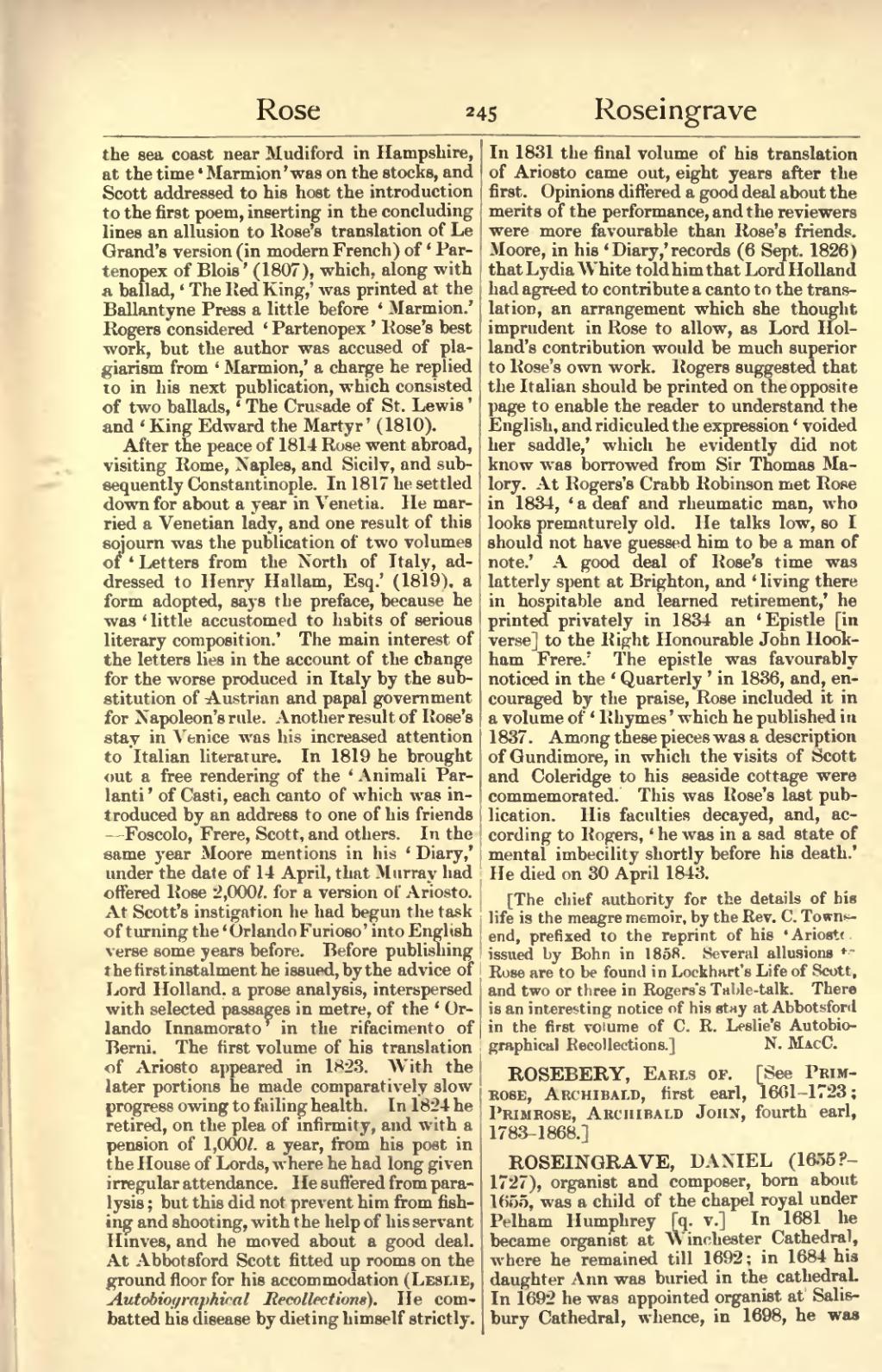the sea coast near Mudiford in Hampshire, at the time ‘Marmion’ was on the stocks, and Scott addressed to his host the introduction to the first poem, inserting in the concluding lines an allusion to Rose's translation of Le Grand's version (in modern French) of ‘Partenopex of Blois’ (1807), which, along with a ballad, ‘The Red King,’ was printed at the Ballantyne Press a little before ‘Marmion.’ Rogers considered ‘Partenopex’ Rose's best work, but the author was accused of plagiarism from ‘Marmion,’ a charge he replied to in his next publication, which consisted of two ballads, ‘The Crusade of St. Lewis’ and ‘King Edward the Martyr’ (1810).
After the peace of 1814 Rose went abroad, visiting Rome, Naples, and Sicily, and subsequently Constantinople. In 1817 he settled down for about a year in Venetia. He married a Venetian lady, and one result of this sojourn was the publication of two volumes of ‘Letters from the North of Italy, addressed to Henry Hallam, Esq.’ (1819), a form adopted, says the preface, because he was ‘little accustomed to habits of serious literary composition.’ The main interest of the letters lies in the account of the change for the worse produced in Italy by the substitution of Austrian and papal government for Napoleon's rule. Another result of Rose's stay in Venice was his increased attention to Italian literature. In 1819 he brought out a free rendering of the ‘Animali Parlanti’ of Casti, each canto of which was introduced by an address to one of his friends—Foscolo, Frere, Scott, and others. In the same year Moore mentions in his ‘Diary,’ under the date of 14 April, that Murray had offered Rose 2,000l. for a version of Ariosto. At Scott's instigation he had begun the task of turning the ‘Orlando Furioso’ into English verse some years before. Before publishing the first instalment he issued, by the advice of Lord Holland, a prose analysis, interspersed with selected passages in metre, of the ‘Orlando Innamorato’ in the rifacimento of Berni. The first volume of his translation of Ariosto appeared in 1823. With the later portions he made comparatively slow progress owing to failing health. In 1824 he retired, on the plea of infirmity, and with a pension of 1,000l. a year, from his post in the House of Lords, where he had long given irregular attendance. He suffered from paralysis; but this did not prevent him from fishing and shooting, with the help of his servant Hinves, and he moved about a good deal. At Abbotsford Scott fitted up rooms on the ground floor for his accommodation (Leslie, Autobiographical Recollections). He combatted his disease by dieting himself strictly. In 1831 the final volume of his translation of Ariosto came out, eight years after the first. Opinions differed a good deal about the merits of the performance, and the reviewers were more favourable than Rose's friends. Moore, in his ‘Diary,’ records (6 Sept. 1826) that Lydia White told him that Lord Holland had agreed to contribute a canto to the translation, an arrangement which she thought imprudent in Rose to allow, as Lord Holland's contribution would be much superior to Rose's own work. Rogers suggested that the Italian should be printed on the opposite page to enable the reader to understand the English, and ridiculed the expression ‘voided her saddle,’ which he evidently did not know was borrowed from Sir Thomas Malory. At Rogers's Crabb Robinson met Rose in 1834, ‘a deaf and rheumatic man, who looks prematurely old. He talks low, so I should not have guessed him to be a man of note.’ A good deal of Rose's time was latterly spent at Brighton, and ‘living there in hospitable and learned retirement,’ he printed privately in 1834 an ‘Epistle [in verse] to the Right Honourable John Hookham Frere.’ The epistle was favourably noticed in the ‘Quarterly’ in 1836, and, encouraged by the praise, Rose included it in a volume of ‘Rhymes’ which he published in 1837. Among these pieces was a description of Gundimore, in which the visits of Scott and Coleridge to his seaside cottage were commemorated. This was Rose's last publication. His faculties decayed, and, according to Rogers, ‘he was in a sad state of mental imbecility shortly before his death.’ He died on 30 April 1843.
[The chief authority for the details of his life is the meagre memoir, by the Rev. C. Townsend, prefixed to the reprint of his ‘Ariosto,’ issued by Bohn in 1858. Several allusions to Rose are to be found in Lockhart's Life of Scott, and two or three in Rogers's Table-talk. There is an interesting notice of his stay at Abbotsford in the first volume of C. R. Leslie's Autobiographical Recollections.]
ROSEBERY, Earls of. [See Primrose, Archibald, first earl, 1661–1723; Primrose, Archibald John, fourth earl, 1783–1868.]
ROSEINGRAVE, DANIEL (1655?–1727), organist and composer, born about 1655, was a child of the chapel royal under Pelham Humphrey [q. v.] In 1681 he became organist at Winchester Cathedral, where he remained till 1692; in 1684 his daughter Ann was buried in the cathedral. In 1692 he was appointed organist at Salisbury Cathedral, whence, in 1698, he was
